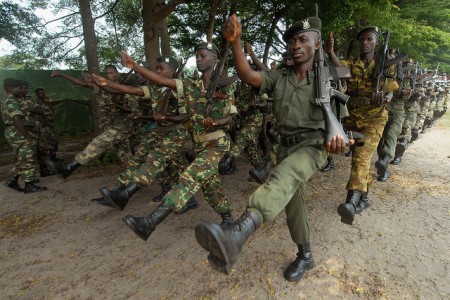
The West can afford to ignore Somalia, Africa cannot. On the evening of July 11th, three bombs went off in Uganda’s capital, Kampala, leaving at least 75 dead and many more injured. There was no need for investigations or inquiries; the perpetrators quickly and proudly claimed responsibility. Carrying out its first attack outside Somalia’s borders, the Islamic militia Al-Shabaab, announced that Uganda was paying the price for deploying troops to Somalia in support of the African Union peacekeeping mission (AMISOM) and the weak Transitional Federal Government (TFG).
The bombings warranted an immediate and stalwart response from Somalia’s neighbors—Ethiopia, Djibouti, Kenya, Uganda, and Sudan—who pledged to reinforce AMISOM with an extra 2,000 troops. It seems, however, that Uganda is also seeking to go beyond simply helping AMISOM.
Reflecting President Yoweri Museveni’s staunch retaliatory resolve, Uganda’s Junior Foreign Affairs Minister Okello Oryem stated that “these attacks mark the beginning of the end of Al-Shabaab.” Apart from supporting an AMISOM troop increase, Uganda is seeking the green light from either the Security Council or the UN-backed TFG in Somalia for a massive military campaign in Somalia. Estimates cite 20,000 as the number of troops necessary to neutralize Al-Shabaab, an amount Uganda seems willing and ready to commit. But, what would this decision mean for Somalia’s future?
Apart from piracy off the Somalian coast, western powers and the UN have not been willing to become directly involved in Somalia— a vestige of the failed 1992 attempt. For this reason, Africa needs to take the lead in seeking effective solutions to Somalia’s political crisis. AMISOM has undoubtedly failed to achieve its mission; most of Mogadishu and the south are controlled by Al-Shabaab and other rival Islamist groups. The lack of troops—only 5,000 of the pledged 8,000 troops have actually been deployed— and available resources has undoubtedly been an obstacle.
It would seem, then, that a strong unilateral response is exactly what Somalia needs. However, recent history would suggest otherwise.
Ethiopia’s 3,000-strong US-backed invasion of Somalia in 2006 is now viewed as a policy disaster. Ethiopia’s presence triggered a violent uproar by Al-Shabaab, making the conflict more brutal than before. Why would an Ugandan invasion prove any different? The ghost of Ethiopia’s failed invasion certainly still haunts Somalia and indeed a large-scale Ugandan invasion could prove wildly counterproductive.
Uganda’s status as an invading force, as well as the war’s possible civilian toll, could easily turn public opinion towards Al-Shabaab. Uganda must understand that Somalia poses a threat to all its neighbors, not just Uganda. Surely, Shabaab’s extremism and unwillingness to negotiate for peace precludes a possible political settlement. However, any military response would need to be as legitimate and sensible to civilians’ human rights as possible. Rather than going at it alone, Uganda should harness the power and support of its neighbors and the West. AMISOM, as a more legitimate regional and multilateral initiative— now endowed with greater (eestern) resources and (IGAD) troops—should, therefore, be Uganda’s preferred platform for engagement.


One reply on “Uganda’s Somali Dilemma – Learning from Ethiopia’s Mistake”
Excellent analysis. I hope that rational minds like yours will be listened to when the decisions are made. As Iraq and Afghanistan have shown, blustering rhetoric can be dangerous.